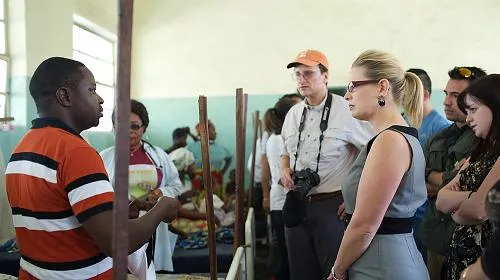Bipartisan delegation travels with CARE to see how U.S. development investments are paying off in better health outcomes for women and girls in Rwanda and the Democratic Republic of the Congo (DRC).
WASHINGTON (Feb. 22, 2016) – A bipartisan group of Arizona delegates, including Congresswoman Kyrsten Sinema (D-AZ), traveled with the poverty-fighting organization CARE to rural and urban communities of Rwanda and the DRC to see how U.S. investments in maternal and child health are empowering individuals and families and resulting in improved health outcomes. The congresswoman was also joined by a delegate from the Tucson Hispanic Chamber of Commerce, a technical expert on global women’s issues and one of CARE’s board members.
The five-day trip explored the benefits women and girls can reap from access to comprehensive health services, highlighting how good health and education is critical to breaking the cycle of poverty. Throughout the trip, the delegates saw how simple solutions – such as access to quality health care services at every stage of a woman’s life- can help ensure women, their families and communities are able to survive and thrive. These crucial health care services include pre- and post-natal care, nutrition counseling, healthy timing and spacing of pregnancies through family planning and access to a variety of essential medicines.
The delegates began their journey in Rwanda, a country that has made impressive strides toward reducing maternal and child deaths, in large part due to the government’s sustained political will and determination to provide integrated, effective, quality health services to its people. There, the delegation visited a girls’ leadership and empowerment program and met with community health workers who discussed the types of comprehensive health services being provided to women, girls and families in Rwanda.
Next, the delegation traveled to Goma, DRC, where they witnessed the obstacles many women, youth and survivors of sexual and gender-based violence (GBV) face in accessing quality health care and support services. The delegation visited a rural health facility and saw the health infrastructure challenges and the great need for investment in comprehensive health services in parts of rural and urban Congo. The DRC has one of the highest maternal mortality rates in the world and 80 percent of women lack access to modern contraceptive methods.[1] GBV is also alarmingly common and systematic rape continues to pose a threat to women and girls.
The delegates later returned to Rwanda, where they learned of the types of health, counseling and referral services offered to victims of abuse and sexual violence, compared to those available in the DRC.
The delegates closed the trip with an opportunity to see how a day in the life of an empowered woman looks. They saw how access to quality maternal and reproductive health services, financial inclusion and economic empowerment and education can help girls, women and families lead healthier, more productive lives.
Participants in CARE’s February 2016 Learning Tour to Rwanda and the DRC included:
- Rep. Kyrsten Sinema (D-AZ)
- Adam Deguire, Chief of Staff to Rep. Matt Salmon (R-AZ)
- Lea Marquez Peterson, President & CEO of the Tucson Hispanic Chamber of Commerce
- Steven Voeller, Partner of Summit Group and former Chief of Staff to Sen. Jeff Flake (R-AZ)
- H. Conrad Meyer, CARE Board Member and former Managing Director of Gleacher & CO.
- Dr. Mary Ellsberg, Founding Director of the Global Women’s Institute, George Washington University
- David Ray, Vice President of Advocacy, CARE
- Kristin Wells, Senior Director of Government Relations, CARE
- Jonathan Young, Regional Advocacy Coordinator for West Coast, CARE
For more information on CARE’s Learning Tours, visit www.care.org/LearningTours. The CARE Learning Tours program is funded by the Bill & Melinda Gates Foundation.
About CARE
Founded in 1945 with the creation of the CARE Package, CARE is a leading humanitarian organization fighting global poverty. CARE places special focus on working alongside poor girls and women because, equipped with the proper resources, they have the power to lift whole families and entire communities out of poverty. Last year CARE worked in 87 countries and reached 82 million people around the world. To learn more, visit www.care.org.
Media Contacts
Brian Feagans, +1 404-979-9453, bfeagans@care.org
[1] World Bank (2014)

